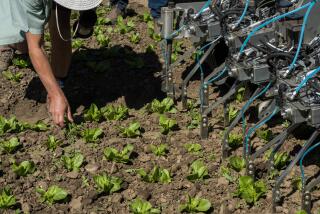The Robots Are Coming, Boo and Hurrah!
- Share via
There aren’t many robots alive in the world today, probably no more than 200,000. And some of them, especially in Japan and France, are not true robots by American definitions; they are just extremely versatile machine tools. At present, most are either blind or have very limited vision; none can see nearly as well as human beings. None have anything approximating taste buds. None have much common sense.
All that granted, robots are a formidable new presence in our world. For example, a typical robot replaces three to five human workers--and not just blue-collar workers, either. Certainly they replace welders in automobile plants and assemblers in electronics plants. But they are also in the process of replacing draftsmen in engineering firms, and quite soon will replace many computer programmers as well. (They help to build computers right now.) In the fairly near future they are scheduled to replace sheep-shearers in Australia, citrus pickers in Florida and secretaries in Los Angeles. (Oracle, a robot in western Australia, sheared its first 200 sheep earlier this year.) Already fairly good diagnosticians, they are expected in time to become actual hands-on doctors.
Can robots think? Yes and no. Under certain circumstances, they can think very well indeed. The earliest and most famous case is the Samuel checkers-playing machine. If you owned one, and taught it to play checkers, after somewhere between 10 and 20 hours it would begin to beat you consistently. This would be true even if you were the best (human) checkers player in the world. Then there is the sad case of Luigi Villa, who in July, 1979, won the world backgammon championship. The next day he rashly agreed to play a $5,000 match with a robot. He lost, 4 games to 1. On the other hand, no present robot could come anywhere near the thought processes involved in being a competent baby-sitter, nor could one hold an intelligent general conversation.
Are robots aware of their own existence? Not yet. The welding and mail-cart types probably never will be. Most leading roboticists predict, however, that within 20 years the advanced models will have both emotions and self-awareness. Will they suffer Monday morning blues? Have temper tantrums? No one knows.
Are robots a threat to human welfare? Depends on your point of view. The cheery view is that robots will rather rapidly free human beings from all forms of boring, dangerous and repetitive work. This is unquestionably what most present robots are doing. Spray-painting cars (now largely done by robots) was hard on the lungs of human workers; robots, having no lungs, can do the job in perfect safety, just as they can assemble widgets and never get bored. Seen thus, robots are the logical--and glorious--climax of the industrial revolution. As lesser machines have already freed us from most manual labor, they will free us from most mental labor, and we can relax, enjoy ourselves, pursue hobbies. Leisure is the precondition of culture, and we will have it in unprecedented quantities. Hence we will be cultured as never before.
The uncheery view is that this kind of freedom really amounts to emptiness. From work, from doing useful things, from contributing to our own survival, we derive the primary meaning of our lives. Leisure has no real meaning except as twinned with work, any more than warm does apart from cold, or rich from poor. In this view, robots will be doing most of the meaningful things, and we will find ourselves envying them. We may even find ourselves parasitically dependent on them.
There is a third and still darker view that robots are the next evolutionary step. Human science is the agent of evolution, this view says, busy producing the crystalline intelligence that is so much more durable and reliable than our own pulpy brains. When its success is complete, any real point in our continued existence will cease. “If we are lucky, they may decide to keep us as pets,” Marvin Minsky once remarked. Minsky is one of the two principal founders of the field of artificial intelligence, Donner Professor of Science at MIT, a top roboticist.
He was only partly joking.
More to Read
Sign up for Essential California
The most important California stories and recommendations in your inbox every morning.
You may occasionally receive promotional content from the Los Angeles Times.













